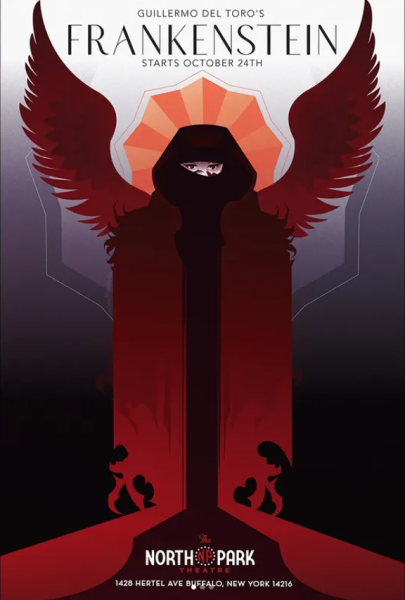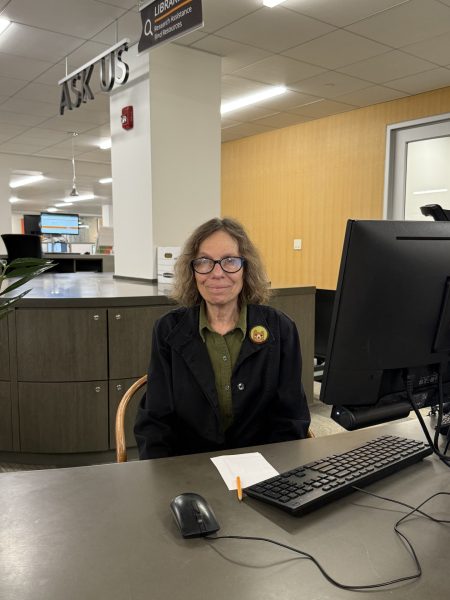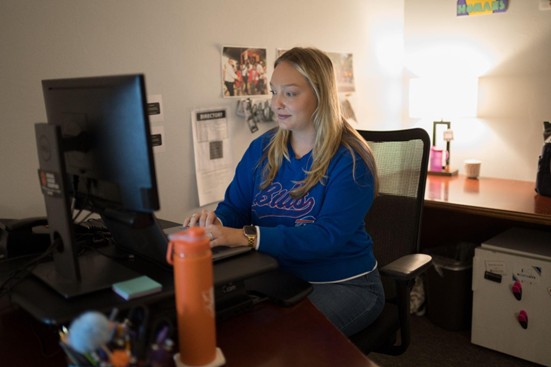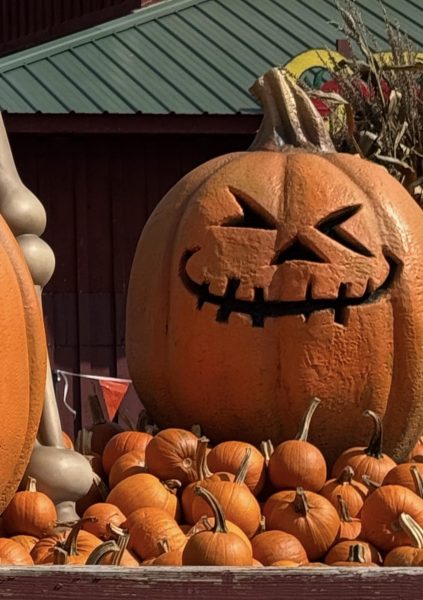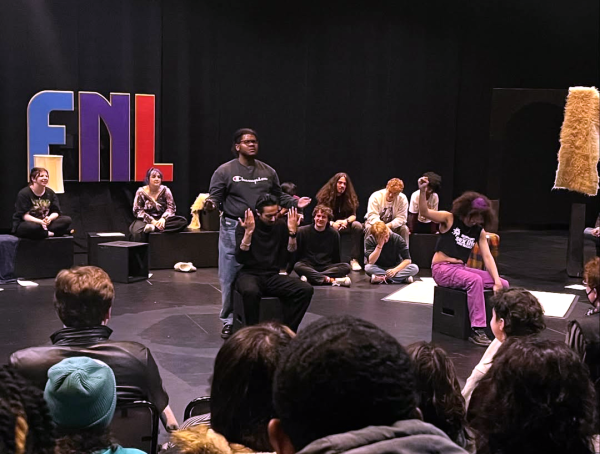English professor expands realms of imagination
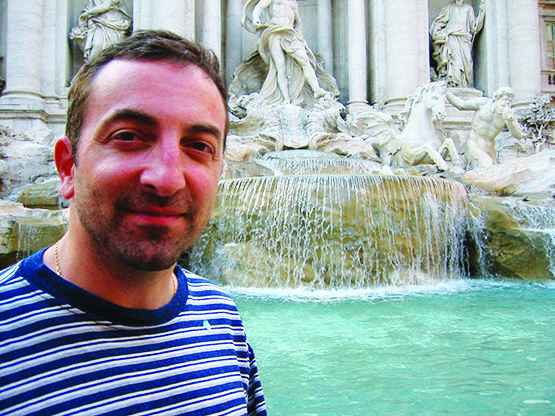
Professor Peter Ramos is a fan of the film “La Dolce Vita” and made sure to visit the Trevi Fountain in Rome, featured in the film.
Peter Ramos, an associate professor of English, has published over nine critical articles and over sixty poems. You may even recognize him from his many local poetry readings. He read some of his work just last week at Talking Leaves, down the road from campus. I asked him to share his advice for students and future poets, along with his views on censorship.
As a writer who has published over nine critical articles and over sixty poems, how did you start writing?
Like many other teenagers, I wrote private little poems in high school during study hall. But I was also in a band that recorded albums and toured during the late ‘80s, and I was the lyricist. This was between my junior year of high school and my junior year of college. But by my freshman year in college I was writing poetry and thinking of that as being different than the lyrics I was also writing for the band. When we broke up, I kept writing poetry. In college I majored in both literature and writing, so I began writing both poetry and criticism back then. I didn’t start publishing poetry until I was in my mid-twenties. I didn’t start publishing criticism until my mid-thirties.
You’ve earned a Bachelor’s in English/ Writing Option, a Masters in Fine Arts in Creative Writing (Poetry,) and a PhD in English (American Literature.) What writing skills were instilled in you throughout your education?
I was taught too many skills in my formal and informal education to name here. Some of the more helpful include taking writing seriously and trying with great effort to be patient. I have learned (again and again) that it takes an awful lot of writing to get to the good stuff. That means you have to write everyday and accept that 99 % of what you write will not be good. It also means you have to be a ruthless and efficient self-editor. But the joy is when you write something that surprises you, that you didn’t think was in you—that’s when you know you have something worthwhile.
Who are your writing influences?
There are also too many to name here. I discovered the Confessional poets (Robert Lowell, Sylvia Plath, Anne Sexton, John Berryman, and in some ways Allen Ginsberg) and the Deep Image poets (Robert Bly, James Wright, W.S. Merwin) when I was in college, and they seem to have had the most enduring influence on my poetry. I also feel I was influenced by the moderns (T.S. Eliot, Wallace Stevens, Marianne Moore, William Carlos Williams,)—at least I’d like to think I was influenced by those giants. But I try to learn as much as I can from poets old and new. For criticism, I was and continue to be influenced by Stanley Cavell, Kenneth Dauber, and other Ordinary Language critics as well as by Eric Sundquist and some others.
How has your writing changed over the years?
Hopefully, my poems have become less prose-like, more attentive to and confident with language and line, less solipsistic, a little more playful than they once were. I still occasionally address familial myths and histories in my work, but I try (with effort) not to do so in a confessional or an uncomplicatedly narrative mode.
How is poetry different from other literature?
That’s a good and important question. I’m not sure there is consensus on the answer these days, even among the professionals. But I believe that poetry is different than other kinds of writing, not only for its charged language but also, and more importantly, because it is the speech of final utterance, or what Allen Grossman once called in conversation the “discourse of last recourse.” He meant by this the idea that poetry is the last avenue of sense-making or declaration after every other avenue has been exhausted, including prayer. In other words, in poetry, one utters what one cannot speak in other forms. When poets (and everyone is a poet in the deepest sense) try to communicate some urgent and singular expression, they find that all other media for expression fail and that poetry is the only vehicle through which they can make their articulation. I’m not referring to what is too private or sacred for other kinds of speech. I mean that in a poem, a speaker says for the first time what cannot be said in any other way. To an important extent, poems do not make specific “points” as, say, essays or journalistic, expository pieces of writing do. Fiction can be poetic, of course, and much poetry and fiction look and feel the same these days. But poems are different (or should be) than fiction in that they are not exactly stories but utterances; even when time-bound, poems often seem spoken beyond the constraints of the present moment. They seem of but also beyond any particular historical time.
This week is Banned Books Week. As a literary critic, what’s your opinion on censorship?
The idea of censorship is quaint and anachronistic, given the availability of books in electronic form, in libraries, etc. Of course I’m against banning books like Invisible Man and The Adventures of Huckleberry Finn in high schools. Wouldn’t it be great if (a) ban in North Carolina got thousands and thousand of high school students throughout the country to secretly read Invisible Man?
Professor Ramos, as an Associate Professor in English here at SUNY Buffalo State, what lessons and advice do you try to instill into your students?
In my classes, I often tend to emphasize the relationship between literature and ethics. I define ethics differently than I would “morality.” That is, ethics is not so much an agreed upon set of values or ideals—what people would consider right or wrong—as it is the ability to act upon one’s consciously and freely chosen beliefs. One’s beliefs need not be particular or unique, but one must be free to choose them. This ability to “freely” choose is of course limited, to some extent, by one’s conditions, by the context in which one finds oneself. On the other hand, I would argue that we are always in a position to dispose ourselves toward our conditions—to make choices, even in dire circumstances. Thus, to take a purely hypothetical example, the man with one leg is still free to choose (on a basic level) the ways in which he wants to address this fact. He can choose to move in a wheel chair, or try to walk with crutches, with a prosthesis, or he can choose not to move at all. At least while we are conscious subjects, we are in a position to make certain choices. Literature, though not ethical itself, nonetheless serves ethics to the extent that it expands the realm of the imaginable, of what there is to choose from. As such, literature can reiterate the possibility of making new choices; it can both remind us of choice and also give us more to choose from and believe in—or refrain from believing in. We may even come to re-investigate those beliefs which we previously took for granted. This is probably true for all the arts, but literature has the capacity to articulate such possibilities through—and often at the very limits of—language. Consequently, it can do so with greater precision. Finally, and connected to these ideas, I try to emphasize that as thinkers and writers, we are also and importantly in the position of choosing, revising, and developing what we think, how we view the world. That is, we are ultimately both free to choose and responsible for what we believe. This is both a great freedom with access to different kinds of power and one that it behooves us to do with care—since it also means we are responsible for what we think and say.
What advice do you give for students who are aspiring to be a poet like you?
I would advise them to try to read as much as they can. And write every day. Keep a journal. The danger of composing poetry on the computer is the temptation of deleting words and phrases you might later decide you want to keep. Once you feel the poem is finished or nearly finished, you can type and print it. Don’t worry if your journal is not filled with finished poems. The point is to go back later and find a seed—a set of lines or even just a few words—that you can eventually use. Be patient. Find a mentor whose poetry you respect and enjoy, and show her or him your own work. Try to be thick-skinned and practical when receiving constructive and (especially) un-constructive criticism. Send your poems out, but prepare yourself for an almost uninterrupted shower of rejection. Remember, too, that while publication is important, the real work is always in making and improving your poems. Make the pleasures of reading and making poems enough. Be relentless in your writing but also be patient with publishing. Did I mention to be patient?
Colleen Young can be reached by email at [email protected] or on Twitter @LiveWithColly.



